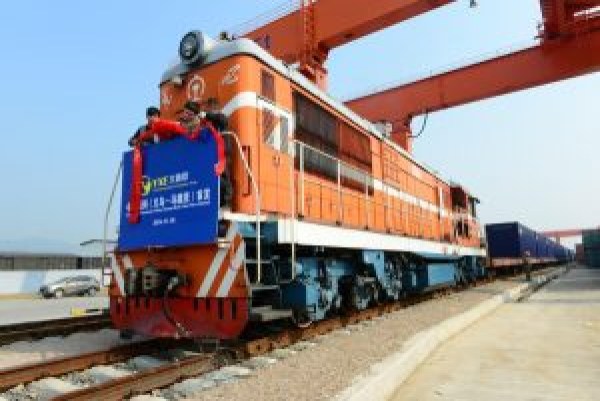China’s European Rail Freight Terminals On The Silk Road Express
China’s Rail services in terms of operating freight containers through from China have been expanding throughout Europe, with some 15 cities now connected directly to China. These include main European Rail Terminals such as
- Moscow (Russia)
- Brest (Belarus)
- Warsaw (Poland)
- Duisburg (Germany)
- Antwerp (Belgium)
- Rotterdam (Netherlands)
- Calais (France)
- London (England)
- Hamburg (Germany)
- Hendaye (France)
- Milan (Italy)
- Madrid (Spain)
The services are operated by a German-Russian JV, Trans-Eurasian Logistics between Germany’s Deutsche Bahn and Russia’s RZhD, and operates container freight trains between Germany and China via Russia
From China, Container trains travel from China to Germany via the Trans-Mongolian or Trans-Siberian Railways, and then via Belarus and Poland, a route known as the Eurasian Land Bridge. Once into the Polish rail network, trains have then entered the European Union and can connect to the vast European Rail network. Theoretically, such trains could reach all European stations.
 The journey is not without difficulties. A break of gauge needs to be crossed when entering Mongolia from China (or Russia directly from China, if traveling via Manzhouli) and another when leaving Belarus for Poland. To date, some 1,700 trains have made this trip, with some of the China city pairings – Yiwu, Wuhan & Chongqing are especially keen on the routing – seeing weekly services between China and European destinations.
The journey is not without difficulties. A break of gauge needs to be crossed when entering Mongolia from China (or Russia directly from China, if traveling via Manzhouli) and another when leaving Belarus for Poland. To date, some 1,700 trains have made this trip, with some of the China city pairings – Yiwu, Wuhan & Chongqing are especially keen on the routing – seeing weekly services between China and European destinations.
Further development of the network can be expected. While the essential Eurasian route is now established, it still requires careful management and logistics planning – large sections of the route are single track, especially across Northern China and Mongolia, and these routes are already stressed in terms of capacity. The China-Mongolia-Russia routes have expanded by over 150% usage over the past 18 months. Ultimately these will require upgrading to parallel tracks.
Additionally, several of the border crossings require upgrading, mainly on the Kazakhstan side with China, and some of the Russia terminals, although development and expansion work is well underway.
More interesting developments are occurring further south. Iran has been busy developing its rail infrastructure, and with a new Port at Chabahar, jointly financed by India, and agreement with Armenia, Georgia, Bulgaria and Romania over an Iranian-Caucasus-Europe Rail link a viable southern route connecting India to Europe via Iran also now looks feasible.
A less understood reason is “Why”? Such rail services compete with both air and sea options. The future of rail travel between China, or Asia and Europe lies in weight capacity. While the rail services are unlikely to eat into shipping volumes, they can provide a viable alternative to air. This is especially true when the time advantage of rail over ship is essential, and when combined with products heavy enough to make the cost saving vs. air transport noticeable.
Typical, and ideal cargoes include complex machinery and spare parts (in both directions), as well as high-end groceries and consumer goods (primarily toward China). While major customers ship their products by full container load, freight forwarders also make it possible to send less-than-container shipments via rail. This ultimately means that the future of Trans-Eurasian rail is not the shipping of cheap plastic products from China to Europe, or the return journeys of Scottish Whisky to China, it is in heavy equipment and related goods. Interestingly, that fits right in with China’s OBOR needs and the related Silk Road developments that are being put in place. Heavy duty equipment, including mining and exploration, as well as the commodities needed to build roads, rail, construction and other logistics needs are all relatively heavy and cumbersome – ideal freight for rail.
About Us
Silk Road Briefing is published by Asia Briefing, a subsidiary of Dezan Shira & Associates. We produce material for foreign investors throughout Eurasia, including ASEAN, China, India, Indonesia, Russia & Vietnam. For editorial matters please contact us here and for a complimentary subscription to our products, please click here.
Dezan Shira & Associates provide business intelligence, due diligence, legal, tax and advisory services throughout the Asian and Eurasian region. We maintain offices throughout China, South-East Asia, India and Russia. For assistance with OBOR issues or investments into any of the featured countries, please contact us at silkroad@dezshira.com or visit us at www.dezshira.com
Related Reading:
Silk Road and OBOR Business Intelligence
Dezan Shira & Associates´ Silk Road and OBOR investment brochure offers an introduction to the region and an overview of the services provided by the firm. It is Dezan Shira´s mission to guide investors through the Silk Road´s complex regulatory environment and assist with all aspects of establishing, maintaining and growing business operations in the region.








